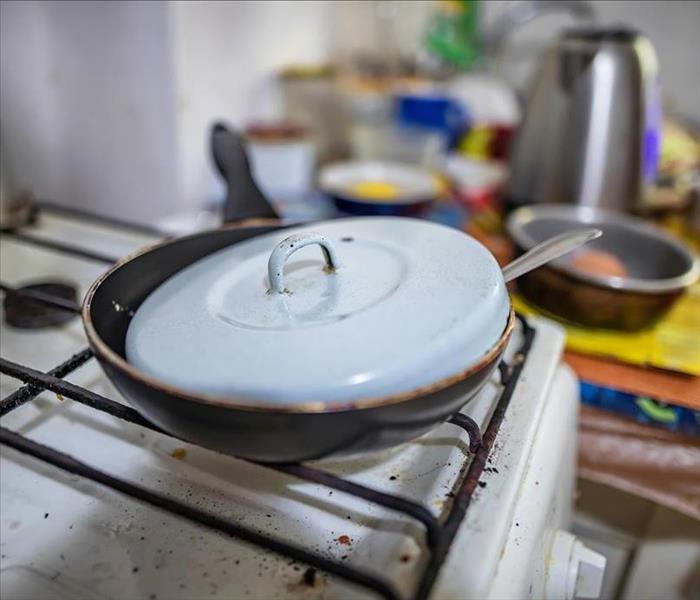How To Put Out a Grease Fire?
2/24/2022 (Permalink)
 Learn More about How To Put Out a Grease Fire and avoid Fire Damage in your Roanoke Rapids, NC Home.
Learn More about How To Put Out a Grease Fire and avoid Fire Damage in your Roanoke Rapids, NC Home.
Your first reaction when you encounter a fire in your home may be to put it out with water. This technique can have disastrous results with a grease fire. Before a problem occurs, learn how to properly extinguish this type of fire.
How To Safely Extinguish a Grease Fire
Cooking is the number one cause of house fires and about half of cooking fires involve grease. Knowing how to properly put out one of these fires can prevent extensive damage to your home and reduce the amount of fire cleanup required.
1. Do Not Use Water
Never try to use water on an oil fire. This can cause the burning oil to splash out of the pan and spread flames to other areas of your kitchen. It could also land on anyone who is standing nearby and cause burns.
2. Call 911
If you are dealing with a large fire or are not sure you can put it out quickly, immediately call 911. These fires can spread quickly, so it is best not to wait until the fire is out of control to call. The 911 operator will give you advice on putting the fire out if it is safe. Otherwise, evacuate your home and wait for the fire department.
3. Shut the Stove Off
If the fire is small, first remove the heat by turning off the stove. If the fire is in the oven, leave the oven door closed. This may extinguish the fire when there is no longer enough oxygen to fuel it.
4. Cover the Fire
Use a baking sheet or lid made from metal to cover the fire. Use tongs to hold the lid so that you don't burn yourself. Do not use a fabric oven mitt. The mitt could catch on fire. Do not use ceramic or glass lids. The lids may shatter.
5. Put Out the Flames
If you can't find a lid, you can use baking soda or salt to put out the flames. However, it may take a lot of it to completely put out the fire. It may be worth purchasing a sheet pan to keep near your stove for future use.
6. Use a Fire Extinguisher
If you are unable to put out the fire using a lid, baking soda or salt, use a Class K fire extinguisher. This model is designed for cooking fires and sprays a soapy foam that smothers the flames. A Class B extinguisher can also be used, but avoid using a Class A, because it is water-based.
7. Clean Up
Even small fires can coat your kitchen in smoke, soot and ash. If you have trouble removing the stains and smells, consider contacting a fire restoration company in Roanoke Rapids, NC, to clean your home. You can usually put a small grease fire out by smothering it with a metal lid, sheet pan, baking soda or salt.
However, if you are dealing with a large fire, you may need to call 911 and evacuate your home. Err on the side of safety and remember to never throw water on a cooking fire.




 24/7 Emergency Service
24/7 Emergency Service